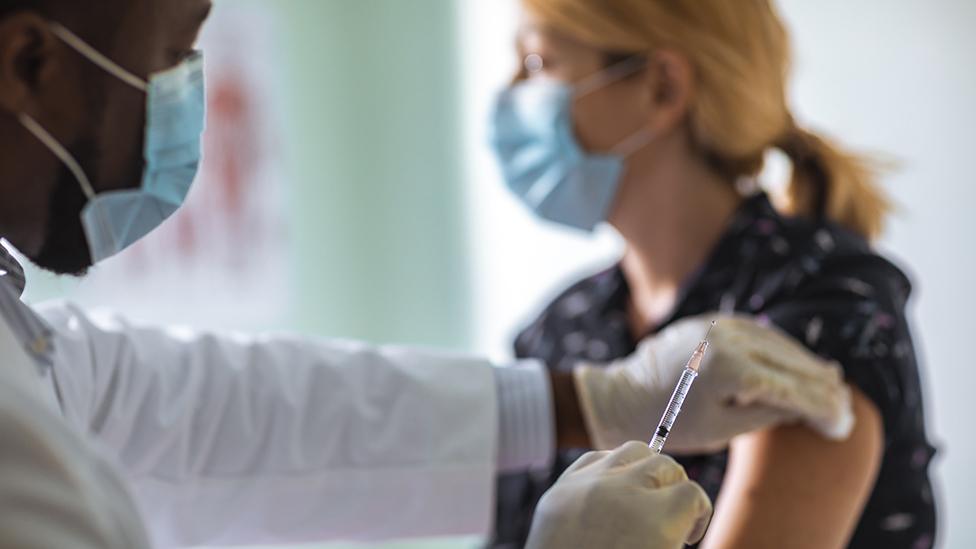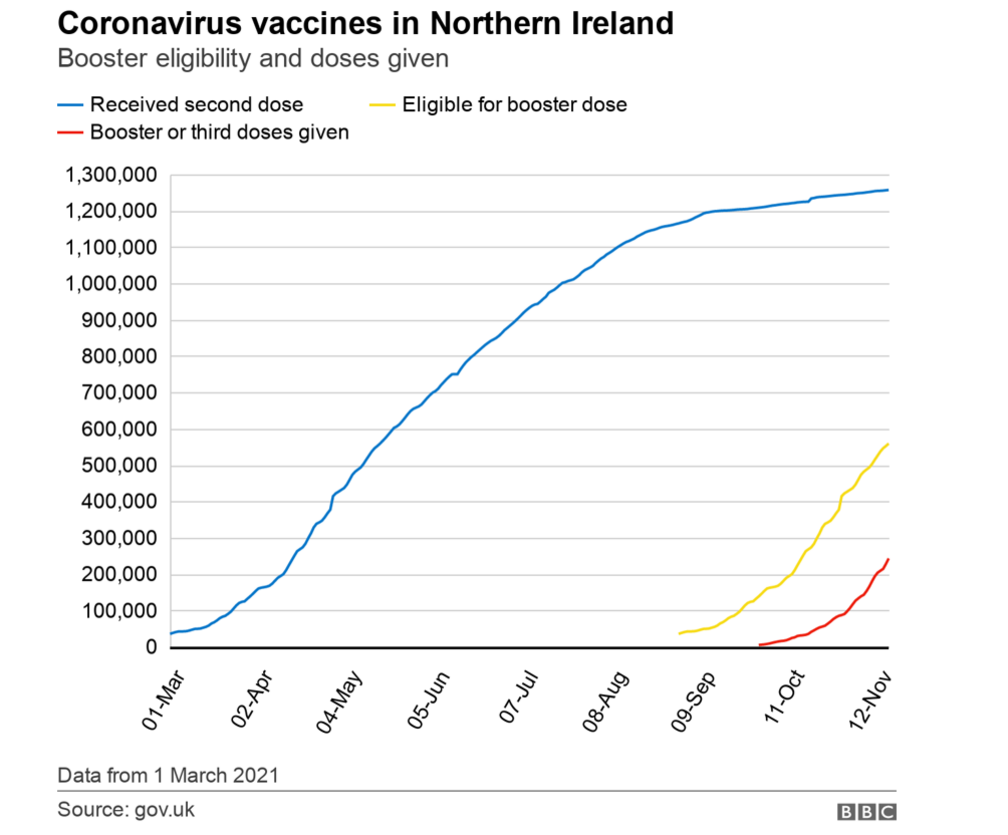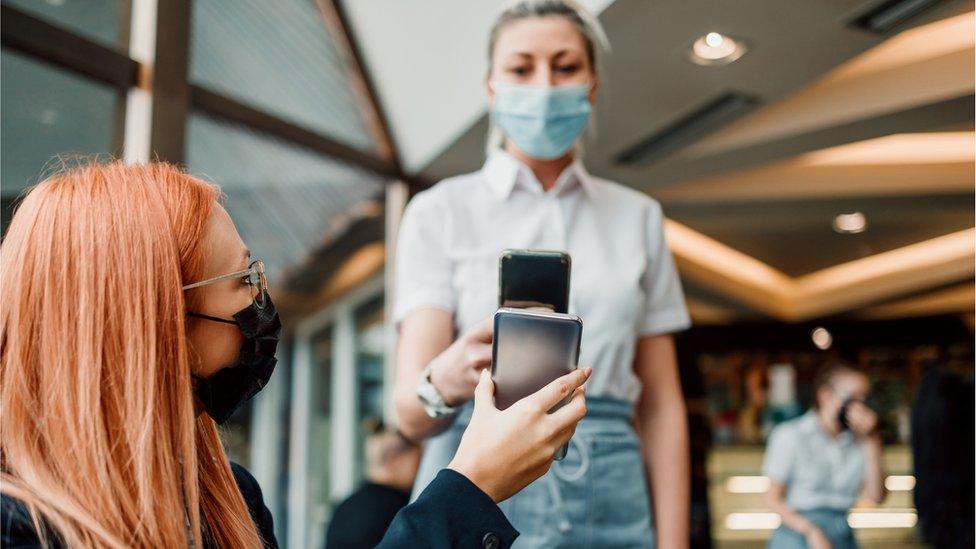Covid-19: Robin Swann unveils plan to speed-up booster uptake
- Published

Health Minister Robin Swann has announced new plans he said will speed up the roll-out of Covid-19 booster doses and increase first dose vaccine uptake.
Measures include extra pharmacy walk-in clinics and more health trust vaccination hubs.
The Department of Health has said less than half of those able to get a booster shot have gotten one.
Northern Ireland has the lowest uptake of the booster shot in the UK.
Latest figures show 243,000 people have been given the shot, 22% of the total target population.
In the last week, 76,000 booster doses were distributed.
The roll-out of the booster programme has been criticised, with First Minister Paul Givan on Wednesday saying that hundreds of thousands of those eligible for booster doses in Northern Ireland had not been contacted.
However the head of Northern Ireland's vaccination programme has defended the delivery of the programme amid accusations it was lagging behind the rest of the UK.

Patricia Donnelly said care homes had been prioritised in the booster roll-out.
The Department of Health said there have been six Covid-19 related deaths and 1,681 cases reported in Northern Ireland on Thursday - the previous day, 12 deaths and 1,848 cases were reported.
Booster doses are intended to top-up protection and help limit the spread of the virus over winter.
People aged 40-49 are now entitled to have a booster jab, as long as six months have passed since their second dose.
Booster numbers 'should climb significantly'
Mr Swann said the new measures will target booster uptake and also delivery of first doses.
They include:
A dedicated walk-in clinic weekend for young people on November 27 and 28, providing first doses for 12-17 year olds
A weekend of additional pharmacy walk-in clinics for all those eligible for booster, first and second doses on 4 and 5 December
Trust vaccination hubs will offer first doses for everyone aged 12 and over as well as booster doses for the 40 to 49-year-old age group who are at least six months from their second dose. Vaccination centres are already running at Ulster Hospital and Royal Victoria Hospital, with others to open by late November/early December.
Mr Swann said he expected the number of people getting booster doses to "climb significantly" and also that "there are indications that demand for first doses is increasing again".

Health Minister Robin Swann said he expects to see a "rapidly increasing number" receiving booster jabs
"Within the past week alone, community pharmacies administered in the region of 1,000 first doses to people aged 18 and over.
"The planned programme of additional walk-in clinics will help meet demand for first doses, as well as for boosters," he said.
He added that it should be remembered that the vaccination programme is being "delivered by a health and social care system experiencing the most sustained and severe pressures in its history".


Every day I'm asked 'when can I get my booster?' - the onus here is on the authorities.
They cannot do enough advertising, and we cannot tell the public enough about what they have to do.
Clearly the virus is several steps ahead of officials and not only here but across the UK and Europe. There is a real sense that we are playing catch up.
I think officials are very disappointed in where figures are at the moment and the pace has been very slow in getting the boosters out. I'm sure they would have preferred to be in a much better position as we go into December.
There doesn't seem to be a straightforward explanation for what's happening in the community. It's complicated.
I get the sense that authorities are not really quite sure what is going to happen next because this has been the pattern of the Delta variant.

Northern Ireland chief scientific adviser Ian Young said more action was needed to roll out the third jab faster.
He told BBC NI's Evening Extra programme: "I think if the boosters were up to 100% of the eligible population, rather than just under 50% than the pressures on hospitals would be less."
Care home focus 'the right decision'
On Wednesday, the person in charge of Northern Ireland's vaccination roll-out said it was right that care homes were prioritised in the booster programme.
Patricia Donnelly said this was part of a deliberate strategy to treat the most vulnerable first and this was more time consuming than running larger hubs.
"The numbers will be smaller. The easiest thing in world is to run a big vaccination centre, you know you can get the numbers through.
"But we had to use the staff out with the most vulnerable group and we don't regret that, that was the right decision.
"So now that we've got that completed and it was only just recently completed, now we're able to divert that resource into running bigger centres."
Ms Donnelly said the programme had also relied on GPs who had been provided with very large packs of Pfizer doses that needed to be used within a three-week period.
This meant they had to wait until enough of their patients had reached their six-month dose interval.
"I know some people got frustrated but GPs really pulled out the stops on this," she said.
- Published2 April

- Published19 December 2021
